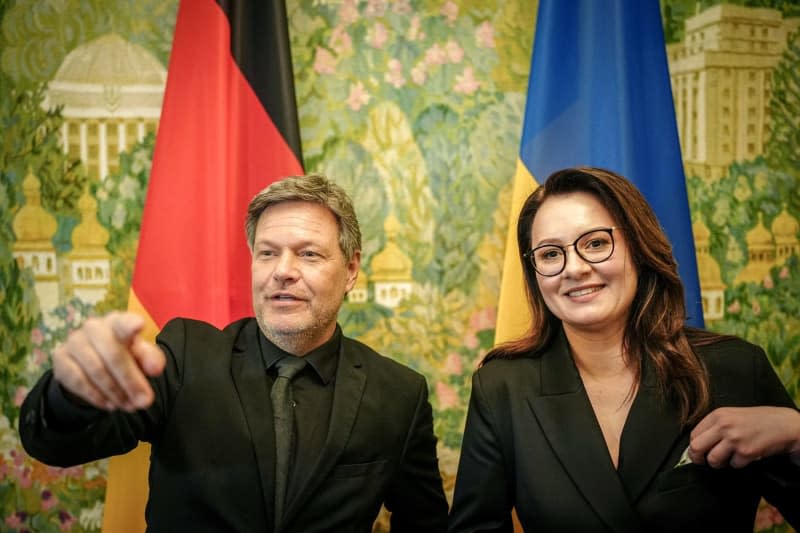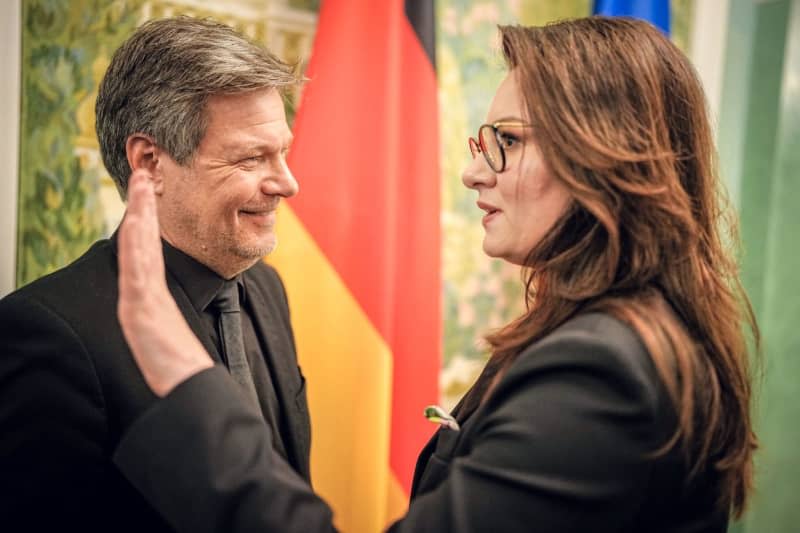German vice chancellor backs Ukraine 'fight for freedom' on Kiev trip

- Oops!Something went wrong.Please try again later.
- Oops!Something went wrong.Please try again later.
German Vice Chancellor Robert Habeck was in Kiev on Thursday for a visit focused on Russian attacks on Ukraine's energy infrastructure, emergency aid, and strengthening the country's war-hit economy.
Habeck said upon arrival that the visit was taking place at a time when Ukraine needed all the support it could get in its "fight for freedom."
"Yes, Ukraine is fighting for its own self-determination, for its territorial integrity against [Russian President Vladimir] Putin's aggression, but is also fighting for the values that unite and characterize Europe," he said.
He laid flowers at a memorial wall for fallen Ukrainian soldiers on Thursday morning.
Habeck, who also serves as economy minister, is accompanied on the trip by a German business delegation.
In Kiev, he was to meet Ukrainian President Volodymyr Zelensky, Deputy Prime Minister and Economy Minister Yulia Svyrydenko and Energy Minister German Galushchenko, among others.
An air raid alert sounded in the Ukrainian capital during Habeck's visit in the morning, the air force said. Ukraine had downed further drones and missiles in Russian attacks on seven regions overnight, the air force said.
Russian drone and missile attacks on Ukrainian power plants have intensified in recent weeks. The renewed aerial assaults, which cut electricity to homes and industry, come as Ukraine's air defences run increasingly thin.
At the weekend, the German government announced it would supply Kiev with another Patriot air defence system.
A badly needed military aid package from the United States remains stalled, while Europe's drive to get more ammunition to Ukraine's battlefield troops has fallen short of its goal.
"The situation is certainly challenging, but the Ukrainians have managed to hold their own time and again over the past two years. And what Germany can do to support them, it will do," Habeck said.
Helmut Rauch, head of Germany's Diehl Defence, which manufactures the IRIS-T air defence systems, was among those accompanying Habeck. Diehl has so far supplied Kiev with three IRIS-Ts.
Diehl is to deliver a fourth system in the coming weeks, Rauch told a meeting of Habeck, Svyrydenko and business representatives. More are set to follow this year, he said.
"Our long-term goal is, of course, to be able to maintain and repair the systems ourselves on site in Ukraine," Rauch said.
Habeck said he hoped for US would agree on the next aid package "so Ukraine can successfully continue its fight for freedom." Svyrydenko described the package as "extremely important."
Ukraine has a budget deficit of around €37 billion ($39 billion), she said, noting that help from the European Commission is important.
"But of course we are counting on this US aid, not only in terms of macro-financial support, but above all in terms of military aid."
Jörg Ebel, the president of the German Solar Industry Association, said he saw huge potential for solar in Ukraine, both in the short- and long-term.
Solar energy is affordable, reliable, and can be easily deployed, Ebel said. "This means that it is also very, very well suited to future attacks, because it cannot be threatened or even switched off in one fell swoop," he said.
Habeck will later travel on to Moldova to meet Prime Minister Dorin Recean. The pro-Western leadership of the country, which is striving to join the EU, sees Moldova, which borders on Ukraine, as threatened by Moscow.
Tensions between Moldova and its breakaway region Transnistria have also risen since the start of Russia's full-scale invasion of Ukraine two years ago. In February, Transnistria's separatists asked Russia for protection "in the face of increasing pressure from Moldova."
The West accuses Russia of deliberately trying to destabilize the situation. "Moscow's aggression is also affecting Ukraine's neighbours with full force," Habeck said.
The trip comes as Germany prepares to put on the next Ukraine Recovery Conference in Berlin on June 11 and 12. German Chancellor Olaf Scholz and Zelensky are jointly hosting the international meeting.


